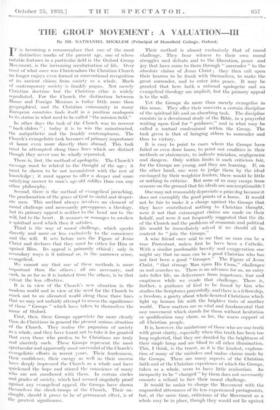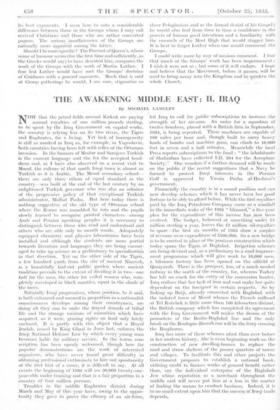THE GROUP MOVEMENT : A VALUATION III
By DR. NATHANIEL MICKLEM (Principal of Mansfield College, Oxford)
IT is becoming a commonplace that one of the most ' distinctive marks of the present age, one of whose • notable features in a particular field is the Oxford Group • Movement, is the increasing secularisation of life. Over • most of what once was Christendom the Christian Church no longer enjoys even formal or conventional recognition of its ancient claims from society as a. whole. .Much of contemporary society is frankly pagan. Not merely Christian doctrine but the Christian ethic is widely repudiated. For the Church the distinction between Houle and Foreign Missions is -today little more than geographical, and the Christian community - in many European countries finds itself in a position analogous to its status in what used to be called "the mission field."
In other days the task of the Church was to recover " back-sliders " ; today it is to win the uninstructed, the antipathetic and the frankly contemptuous. The Church's evangelistic task becomes of primary importance at home even more directly than abroad, This task must be attempted along three lines which are distinct though they never can be wholly separated.
There is, first, the method of apologetic. The Church's message must be related to the thought of the age ; it must be shown to be not inconsistent with the rest of knowledge ; it must appear to offer a deeper and more satisfying answer to man's age-old riddles than can any other philosophy. • Second, there is the method of evangelical preaching, the proclamation of the grace of God to sinful and desper- ate men. This method always involves an clement of Moral challenge and necessarily presupposes a theology, but its primary appeal is neither to the head nor to the will, but to the heart. It assumes or manages to awaken spiritual need which then it satisfies.
Third is the way of moral challenge, which speaks directly' and more .or less exclusively to the conscience and the will. It sets before men the Figure of Jesus Christ and declares that they must be either for Him or against Him. Its appeal is primarily ethical ; only in secondary ways is it rational or, in the narrower sense, evangelical.
We cannot say that one of these methods is more important than the others all are necessary, and each, in so far as it is isolated from the others, 'is to that extent the• less effective.
It is in view of the Church's new situation in the modern. world and in view of the need for the Church to reach out to an alienated world along these three lines that we may not unfairly attempt to assess the significance of these " Groups " which have taken to themselves the name of Oxford.
First, then, these Groups appreciate far more clearly , than do Christians in general the present serious situation • of the Cluirch. They realise the paganism of society as a whole, and they have learnt not to take it for granted that even those who profess to be Christians are truly and sincerely such. These Groups represent the most spectacular and apparently most successful of the Church's . evangelistic efforts in recent years. Their fearlessnesS, their confidence, their energy as well as their success have deeply iMpreSsed the`Church as a whole and have quickened the hope and stirred the conscience of many 'who are not numbered with them. In certain circles and grades of society, which had seemed singularly proof against any evangelical appeal, the Groups have shown themselves the shock-troops of the Church. Their on- slaught, should it prove to be of permanent effect, is of the greatest significance. Their method is almost exclusively that of moral challenge. They bear witness to their own moral struggles and defeats and to the liberation; peace and joy that have come to them through " surrender " to the absolute claims of Jesus Christ ; they then call upon their hearers to be frank with themselves, to make the .great surrender, and to enter into peace. It may be granted that here both a rational apologetic and an evangelical theology are implicit, but the primary appeal is to the will.
Yet the Groups do more than merely evangelise in this sense. They offer their converts a certain discipline of the spiritual life and an absorbing task. The discipline consists in a devotional study of the Bible, in a prayerful waiting upon God for " guidance," and in what may be called a mutual confessional within the Group. The task given is that of bringing others to surrender and thus to victory.
It is easy to point to cases where the Groups have failed or even done harm, to point out crudities in their methods or statements, to indicate mistakes, negligencies and dangers. Only within limits. is such criticism fair, for the Groups are young, and they are learning: If, on the other hand, one were to judge them by the ideal envisaged by their weightier leaders, there would be little or nothing to criticise. But none of us may escape from censure on the ground that his ideals are unexceptionable'l One may not reasonably depreciate a prize dog because it does not exemplify the good points of a horse. It would not be fair to make it a charge against the Groups that they have contributed nothing to Christian thought, were it not that extravagant claims are made on their behalf, and were it not frequently suggested that the ills of the Church and the problems of economic, and political life would be immediately solved if we should all be content to " join the Groups." A wise friend once said to me that no man can be a true Protestant, unless first he have been a Catholic. With a similar pardonable brevity and exaggeration one might say that no man can be a good Christian who has not first been a good " Grouper." The Figure of Jesus Christ, " that strange Man upon His Cross," challenges' us and searches us. There is no advance for us, no entry into fuller life, no deliverance from impotence, fear and emptiness while we evade that challenge. There is, further, a guidance of God to be found by him who studies the Scriptures prayerfully, and there is a fellowship, a freedom, a gaiety about whole-hearted Christians which light up human life with the brighter tints of another world. These matters are so vital and fundamental that any movement which stands for them without hesitation or qualification may claim, so far, the warm support of all Christian people. It is, however, the misfortune of those who see one truth with great clarity, especially when this truth has been too long neglected, that they are dazzled by the brightness of their single lamp and are blind to all other illumination. This, I think, is the truest, as it is the kindest, explana- tion of many of the mistakes and undue claims made by the Groups. There are many aspects of the Christian faith and of the Christian experience of which the Groups, taken as a whole, seem to have little realisation. An incapacity to be " changed " by them does not necessarily connote a refusal to face their moral challenge.
It would be unfair to charge the Movement with the unguarded utterances of its less experienced protagonists, but, at the same time, criticisms of the Movement as a whole may bc in place, though they would not lie against its best exponents. I seem here to note a considerable difference between those in the Groups, whom I may call revived Christians' ibid those who are rather converted pagans. The serious ,,insufficiencies of the Groups are naturally more apparent among the latter.
Should I' be more specific ? The Provost 'of Queen's, whose sense of humour seems (for the first time and sufficiently, as the Greeks would say) to have deserted him, compares the work of the Groups with the work of Martin Luther. I fear lest Luther would have met the GroUps' doctrine of Guidance with a general massacre. Much that is said at Group gatherings he* would, I am sure,' stigmatise as sheer Pelagianism and as the formal denial of his Gospel ; he would also find from time to time a 'confidence in the powers of human good intentions and a familiarity with the counsels of the Most High that would stagger him. lt is best to forget Luther when one would commend the Groups. I could write more by way of anxious comment. I fear that 'nine') of the Groups' work has been impermanent ; I wish it were not so ; but some of it will endure, hope and believe that the Movement, before it ,passes, will be used to bring many into the Kingdom and to. quicken the whole Church.



























































 Previous page
Previous page